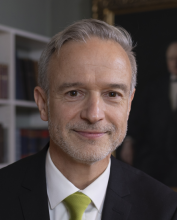MSE 298 Seminar: Basic Materials Science Aspects In Sustainable Metallurgy

Abstract: The metallurgical sector is a cornerstone of modern civilization, since 5 millennia, but it is also responsible for approximately 10% of global greenhouse gas emissions (due to fossil reductants), 10% energy demand and huge amounts of waste. Further challenges lie in reclaiming strategic and expensive elements from waste streams. This lecture goes into some of the basic materials science opportunities lurking behind these grand challenges associated with the global transition toward more sustainable metallurgy, manufacturing and energy supply. Primary mitigation strategies involve replacing fossil carbon with sustainably produced hydrogen and/or electrons as reductants and recycling. The huge scale of global metal production — 2 billion tons annually — means that the efficient use of these reductants is paramount, requiring research on sparse use of hydrogen, alternative reductants, high metallization degrees and fast reduction kinetics. We will delve into the governing mechanisms of hydrogen-based direct reduction and plasma-assisted reduction of iron oxides. The efficiency of these processes is not merely a question of thermodynamics but is governed by a complex interplay of materials phenomena. These include mass transport kinetics, Kirkendall effects, nucleation and phase transformations, chemical partitioning and the evolution of microstructure, porosity and damage within the oxide feedstock during reduction. Understanding how these mechanisms are influenced by external conditions — such as reductant gas mixtures including hydrogen and ammonia, temperature, pressure, and the initial oxide chemistry — is the key to designing efficient direct reduction or plasma reactors. The talk will also show how to make new alloys directly in a single step by co-reducing mixed oxide feedstock and even toxic industry waste, material that would otherwise have to be dumped at high costs. Further topics discussed include the question of how to produce high performance alloys with high scrap fractions since a holistic strategy must also embrace the full lifecycle of metallic materials. This includes enhancing alloy recyclability, mitigating material losses through corrosion and wear, and implementing circular economy principles to reduce the demand for primary production. The ultimate goal is to lay the scientific foundation for the sustainable production of metals and alloys at an industrial scale and affordable cost, thereby enabling a sustainable future for this essential industry.
Bio: Dierk Raabe studied music, metallurgy and metal physics (summa cum laude) at RWTH Aachen, Germany. After his doctorate in 1992 (summa cum laude) and habilitation in 1997 at RWTH Aachen, he received a Heisenberg fellowship and worked at Carnegie Mellon University and at the High Magnetic Field Lab in Tallahassee. He joined Max Planck Society as a director in Düsseldorf at the Max Planck Institute for Iron Research (now: Max Planck Institute for Sustainable Materials) in 1999. His main research interest is sustainable metallurgy, i.e. to make industrial production, use and recycling of materials more sustainable, focusing on basic research with high leverage for CO2 emission mitigation and lower energy consumption. His specific interests are in sustainable metals (specifically "green" steel, Nickel, Aluminium, Titanium etc.), recycling-oriented material design, metal physics, interfaces, phase transformation, atom probe tomography, materials theory, hydrogen and artificial intelligence methods in materials science. He received the Gottfried Wilhelm Leibniz Award (the highest German Science Awards) and two ERC Advanced Grants (the highest European Research Grant). He is professor at RWTH Aachen and at KU Leuven in Belgium. He is a Doctor Honoris Causa at the Norwegian Technical University Trondheim. He is a member and Senator of the German National Science Academy Leopoldina and of the U.S. National Academy of Engineering.
Share
Related Content
| Attachment | Size |
|---|---|
| 2.03 MB |
Upcoming Events
-
CEE Ph.D. Defense Announcement: Breaking New Ground - Excavation Performance in Tar-Infused and Conventional Soils for LA Metro D-Line Extension Project
-
MSE 298 Seminar: Tunable Optical Metasurfaces And Zero-Index Materials
-
EECS Seminar: Terahertz metasurface quantum-cascade vertical-external-cavity surface-emitting-lasers (VECSELs)
-
EECS Seminar: AI-Driven Design Automation for Multi-Chip Integration in AI Chips
-
CBE 298: Cell-Free Systems for Studying and Engineering Protein Assemblies
